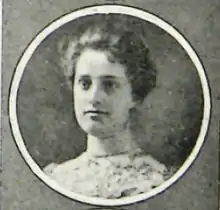Lucy Allen Smart
Lucy Allen Smart (née Lucy Allen, 1877–1960) was an American librarian and curator.
Lucy Allen Smart | |
|---|---|
 | |
| Born | January 12, 1877 |
| Died | September 7, 1960 |
| Spouse | George Smart |
Work at Ohio State
Allen began her studies to become a librarian at Ohio State University in 1894. While there she assisted Warren K. Moorehead, professor of archaeology at Ohio State and the curator of the Ohio State Archaeological and Historical Society's museum, in compiling a catalogue and map of archaeological sites in the state.[1] Moorehead was forced to resign his post in 1897 when he contracted tuberculosis.[2] He recommended that Allen finish the catalogue, saying that she knew the material "better than any other person – next to myself". She also took over his role as curator for a five-month period in 1898.[1] Her successor, William Corless Mills, revised and expanded Moorehead and Allen's map and published it as the landmark Archaeological Atlas of Ohio,[3] the first comprehensive state archaeological survey produced in the United States.[4] Despite her contribution, Allen was not credited in the final publication.[1]
Allen was then hired as an Assistant Librarian at Ohio State, a post she held until 1901. During this time she earned a master's degree in library science.[1]
Later career
In 1901, Allen left Ohio State to study under historian Albert Bushnell Hart of Harvard University, but she did not complete her PhD.[1] In the same year she married George Smart, the co-founder and editor of the Columbus Citizen.[5] Whilst married she wrote the History of Forest Hills from the Days of Indians, which was published in 1924.[6]
After her husband's death in 1925, Allen became the assistant to the headmaster and librarian at Kew-Forest School in Forest Hills, New York,[1][7] and was appointed the Dean of Girls in 1947.[7]
In 1937, she was appointed to the board of trustees of the Queensborough Public Library, becoming the first female on a citywide library board. She also served as the editor of The Forest Hills Gardens Bulletin, and was known for her living history performances, portraying American women such as Dolley Madison and Harriet Beecher Stowe.[1][6]
References
- Lepper, Brad (26 September 2015). "Lucy Allen". Trowelblazers. Retrieved 6 November 2016.
- Christenson, Andrew (2011-05-12). "Who were the Professional North American Archaeologists of 1900? Clues from the Work of Warren K. Moorehead". Bulletin of the History of Archaeology. 21 (1): 4. doi:10.5334/bha.2112. ISSN 2047-6930.
- Mills, William C. (1914). Archeological Atlas of Ohio. Columbus, OH: Ohio State Archeological and Historical Society.
- Dancey, William C. (April 12, 1984). The 1914 Archaeological Atlas of Ohio: Its History and Significance. 49th Annual Meeting of the Society for American Archaeology. Portland, OR.
- Ohio State University (1901). Thirty-First Annual Report of the Board of Trustees of the Ohio State University to the Governor of Ohio. Columbus, Ohio: Ohio State University. p. 56. Retrieved 6 November 2016.
- Perlman, Michael H. (2015). Legendary Locals of Forest Hills and Rego Park. Charleston, SC: Arcadia. p. 30. ISBN 9781467101882. Retrieved 6 November 2016.
- "School History". Kew Forest School. Archived from the original on 2016-07-28. Retrieved 2016-07-31.